National Data
“When you get those mini victories and you see that a child is learning and something positive is happening as a result of your time in your classroom, that’s a big deal.”
— MIDDLE SCHOOL TEACHER
Teachers Bring Passion and Commitment to Their Challenging Work
- Nearly every teacher (98%) agrees that teaching is more than a profession; it is how they make a difference in the world—one child at a time
- Eighty-two percent (82%) of teachers cite constantly changing demands is the number one challenge facing teachers today
- Still, 88% of teachers agree the rewards of teaching outweigh the challenges
TEACHERS TEACH TO MAKE A DIFFERENCE AND BECAUSE THEY LOVE THE CRAFT OF TEACHING
Overwhelmingly, teachers say they chose the teaching profession to make a difference in children’s lives, followed closely by a desire to share their love of learning and teaching and to help students reach their full potential. Together, these findings show that most teachers enter the profession to make an impact on the world by educating students.
Teachers’ Views on the Most Significant Reasons for Becoming a Teacher
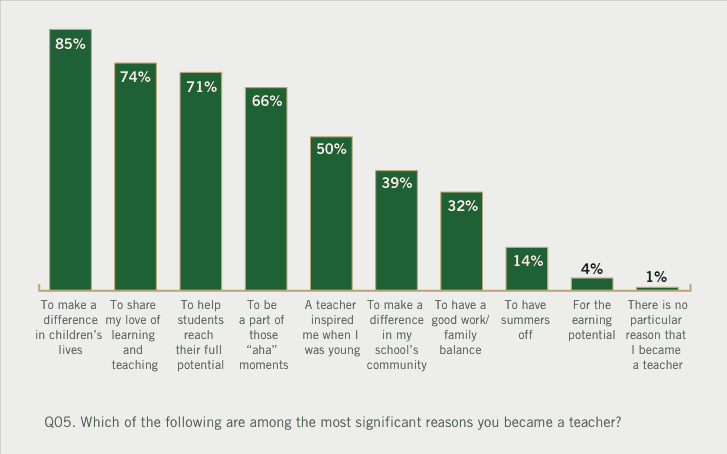
Base: Total Respondents. Details: page 11 in the full report. State data here.
The most-cited reasons for becoming a teacher display a commitment and a passion for the profession. Teachers are far less likely to report becoming a teacher for reasons not connected to students, such as summers off. More information on why teachers teach—including subgroup analysis by years of teaching experience and career path taken to become a teacher—is available in the full report.
GREAT TEACHING DEMANDS A MASTERY OF MANY SKILLS AND TALENTS
Nearly all teachers (99%) see their roles extending beyond academics to include things like reinforcing good citizenship, building resilience and developing social skills.
Agreement With Statements About the Teaching Profession
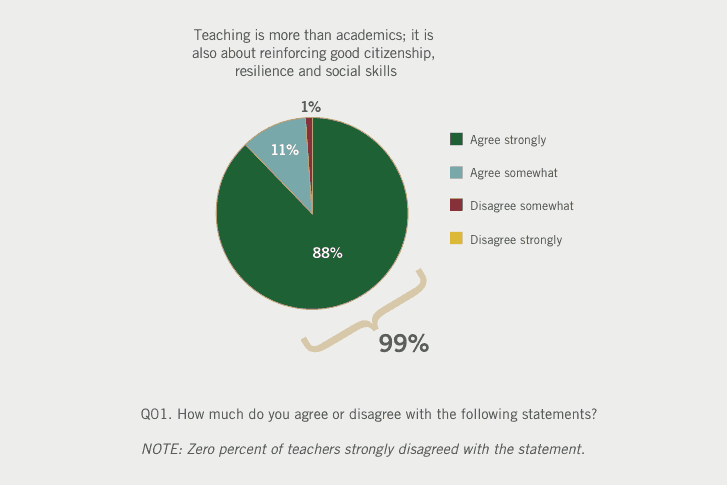
Base: Total Respondents. Details: page 15 in the full report. State data here.
When asked about the importance of a variety of skills and talents that make a “great” teacher, responses show that the hallmark of great teaching is not one single characteristic, but rather a combination of skills. More data on the characteristics of great teaching and the impact of teachers are available in the full report.
TEACHERS ACKNOWLEDGE MANY CHALLENGES IN THE PROFESSION
Teachers cite a variety of challenges in their profession, with a majority of teachers pointing to constantly changing demands on teachers and students as the most significant challenge. From there, teachers report challenges such as not enough time spent collaborating with colleagues, large class sizes and more.
Teachers’ Views on the Most Significant Challenges Faced as a Teacher
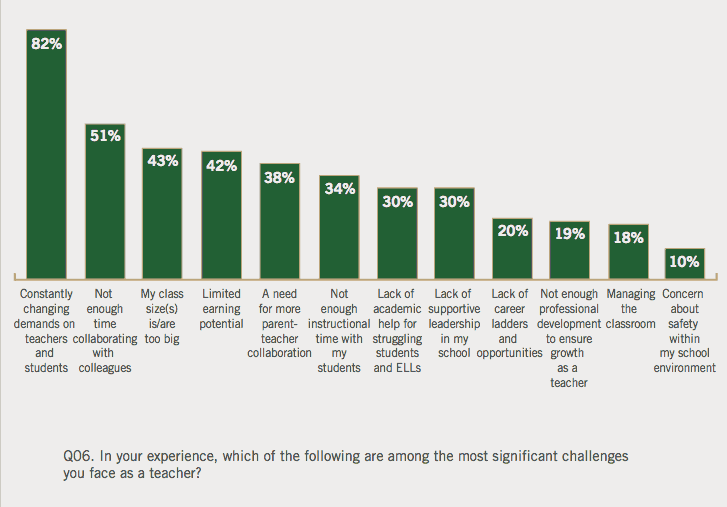
Base: Total Respondents. Details: page 17 in the full report. State data here.
Additional information on the challenges faced as a teacher—including subgroup analysis by grades taught, years of teaching experience and more—is available in the full report.
CLASSROOM DYNAMICS ADD TO THE COMPLEXITY OF TEACHERS’ DAY-TO-DAY MISSION
With a diverse student body, as defined by the seven metrics below, teachers are working with students of varied learning levels and characteristics. Nearly all teachers (99%) have students in their classrooms who need assistance/intervention for social, emotional or behavioral challenges and 73% report working in classrooms with student reading levels that span four or more grade levels.
Percentage of Teachers With Each Student Population in Their Classroom(s)
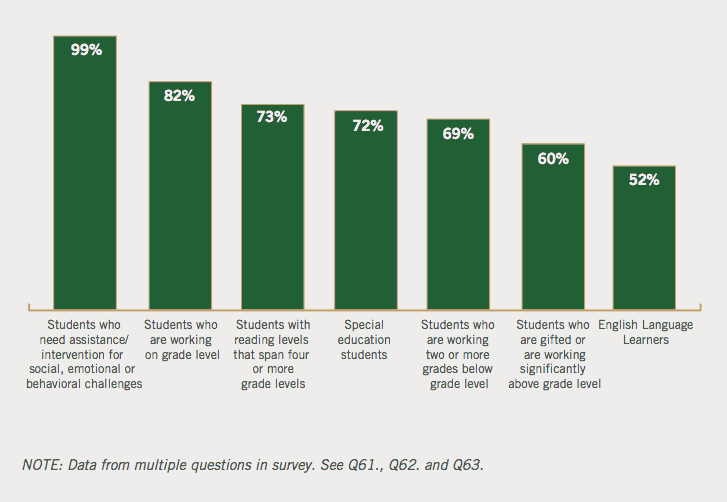
Base: Total Respondents. Details: page 23 in the full report. State data here.
All teachers report having in their classrooms two or more of the seven student populations asked about in the survey. Nearly one-quarter have all seven.
Percentage of Teachers Who Report Differing Student Populations in Their Classroom(s)
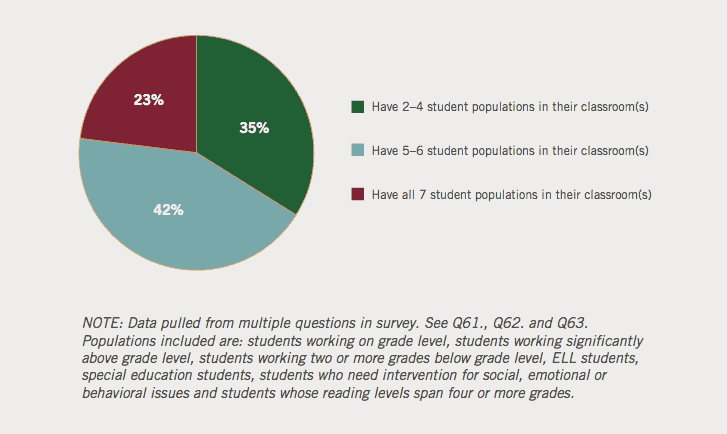
Base: Total Respondents. Details: page 24 in the full report. State data here.
More information on classroom dynamics—including a spotlight on teachers who teach widely differing student populations—is available in the full report.
THE REWARDS OF TEACHING OUTWEIGH THE CHALLENGES
Challenges aside, nearly nine in 10 (88%) teachers agree that the rewards of teaching outweigh the challenges—a finding that remains consistent across subjects taught, median household income of the school community and age of teacher. Additional information on the rewards of teaching—including subgroup analysis by year and select subgroups—is available in the full report.
Teachers’ Views on Teaching
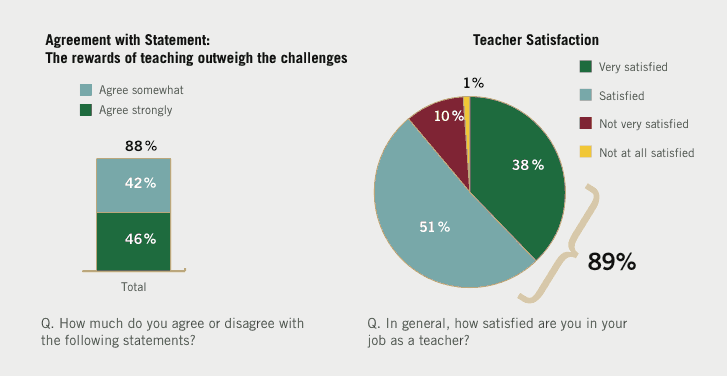
Base: Total Respondents. Details: pages 26–27 in the full report. State data here.
It’s not just that the rewards of teaching outweigh the challenges; a majority of teachers feel gratified by their careers, with a full 89% saying they are either satisfied (51%) or very satisfied (38%). Further, when teachers believe their voices are heard, they are more likely to be satisfied in their jobs. Specifically, those who feel the views of teachers like them are heard and valued at the district, state or national level are more likely to be very satisfied in their jobs than are those who feel teachers’ views are valued at the school level only.
Teachers’ Degree of Satisfaction in Their Job as a Teacher, by Degree to Which They Feel the Voices of “Teachers like me” Are Heard and Valued
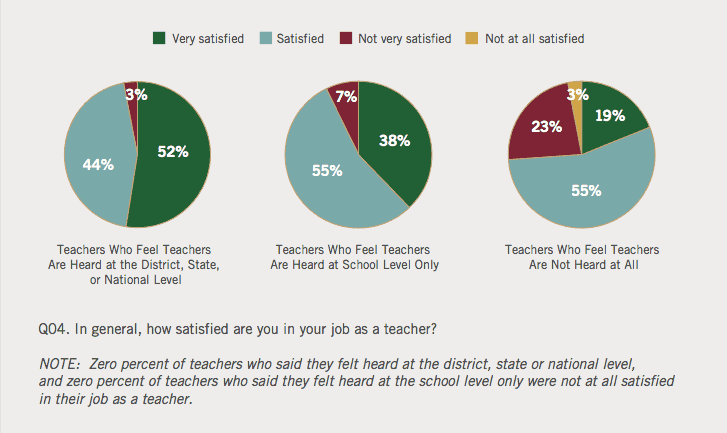
Base: Total Respondents. Details: page 30 in the full report.
While nearly seven in 10 teachers feel that teachers’ opinions are heard in their school, far fewer teachers feel teachers’ voices are heard at the district level and even fewer still at the state and national levels.
Percentage of Teachers Who Feel the Opinions of “Teachers like me” Are Heard and Valued at Each Level
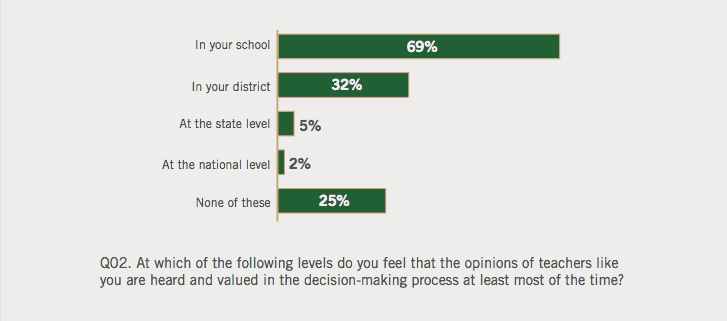
Base: Total Respondents. Details: page 29 in the full report. State data here.
Additional information on teachers who feel the voices of teachers like them are heard and valued—including subgroup analysis by teachers who strongly agree that teachers are well-respected in their community—is available in the full report.
The importance of hearing teachers’ views and voices on all aspects of their work cannot be overstated, which is why Scholastic and the Bill & Melinda Gates Foundation conduct the Primary Sources study—to place the voice of teachers at the center of the conversation on the most pressing issues facing education in America today. This year’s report will continue to highlight the nuanced views of teachers from around the country as they tackle their important work in an era of change.